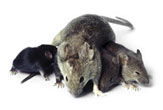Mice Find Lost Memories

Long lost memories can be recovered in mice suffering from recall problems similar to those associated with Alzheimer's disease in humans.
The memories of mice with neuronal damage improved when the animals lived in enriched environments or when they were given a new class of experimental drugs, said MIT neurobiologist Li-Huei Tsai.
To instill long-term memories, Tsai and her colleagues exposed mice to memorable situations, such as a shock in a certain cage. Later, it took no time for the mice to freeze in fear as soon as they were placed a shock box. After four weeks of training, the researchers caused some neural degeneration in the mice. After the brain damage, the mice no longer remembered their experiences in the shock box.
The scientists then moved the mice from small, boring cages into plush homes with other mice, novel and colorful toys and exercise wheels. When they were placed back in the shock box, they froze, showing they had recalled the lost memories.
The same effect occurred after mice took a four-week treatment of drugs called histone deacetylase (HDAC) inhibitors.
"The results were strikingly similar," said Tsai, whose research is detailed in the April 29 in the online version of the journal Nature.
Enriched environments and drugs similar to those used in the recent study could someday be used to treat people with Alzheimer's, Tsai said.
Sign up for the Live Science daily newsletter now
Get the world’s most fascinating discoveries delivered straight to your inbox.
"Our study demonstrated that even in people with pretty bad memory loss, this approach may still be beneficial," Tsai said. The HDAC inhibitors and enriched environments, she said, might be just as helpful to patients in the early stages of Alzheimer's.
More experiments are needed to look for side effects and test the safety of long-term use of the drugs on people, she said.
But the memory-boosting results of the enriched environment impressed Tsai to such a degree that she changed her lifestyle immediately even though she does not have Alzheimer's. After observing the mice regain their memories, she started hitting the gym three times a week.
Prior to Tsai's research, scientists were unclear as to what happens to memories once they go missing. Do we lose memories forever or do they just become impossible to recall?
The results show that, with help, forgotten memories in mice can be rescued.
"Our research suggests that memories are not completely erased," said Tsai. "Because they can be recovered, it's more likely a retrieval problem."
- Top 10 Mysteries of the Mind
- The Greatest Modern Minds
- All About Memory









